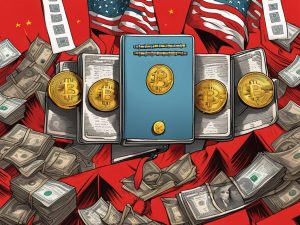Investor Steve Eisman: Fed Should Hold Off on Interest Rate Cuts
Steve Eisman, the investor known for his successful short positions against the housing market before the 2008 crisis, believes that it would be unwise for the Federal Reserve (Fed) to start cutting interest rates. In an interview with CNBC, Eisman states that the US economy appears strong due to healthy consumer spending.
Eisman argues that there is no reason to entertain the idea of a collapse or recession until weak economic data emerges. He highlights that 70% of the US economy is consumer-driven and emphasizes that consumers are currently in a good financial state with savings and spending power. Therefore, he questions why there is so much hysteria surrounding the economy.
Concerns Over Consumer Debt
Eisman does express concern about the health of the economy if consumers begin struggling to pay off their debt. He closely monitors credit quality and states that a deterioration in consumer credit quality, similar to what occurred before the 2008 crisis, would be cause for alarm.
Eisman’s Perspective on Interest Rates
Despite fears of a recession, Eisman believes it would be better for the Fed to maintain current interest rates. He argues that rate cuts could lead to inflation resurfacing. According to Eisman, the Fed has successfully engineered a soft landing for the economy, with inflation decreasing and a strong overall economic performance. He suggests that rate cuts should be saved for when the economy weakens significantly.
Hot Take: Eisman’s Cautionary Stance on Interest Rate Cuts
Steve Eisman, famous for his bets against the housing market before the 2008 crisis, warns against hasty interest rate cuts by the Federal Reserve. He believes that as long as the US economy remains solid, with healthy consumer spending and credit quality, there is no need for rate cuts. Eisman suggests that it would be wiser for the Fed to declare victory in their current economic achievements and wait for further data before considering any adjustments. By holding off on rate cuts, Eisman argues that the risk of inflation resurgence can be mitigated.


 By
By
 By
By
 By
By
 By
By
 By
By